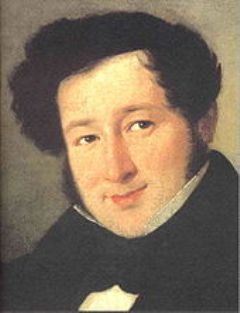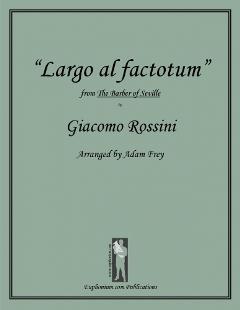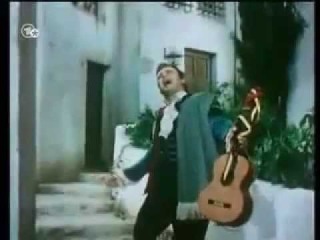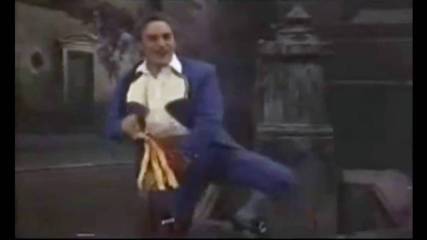Largo Al Factotum from The Barber of Seville
Largo Al Factotum from The Barber of Seville
Young Count Almaviva is in love with Rosina, ward of the cantankerous Dr. Bartolo. With the help of some local musicians, he serenades her outside her balcony window (“Ecco ridente”), but she does not appear. Despairing, he dismisses the band. Just as they disperse, he hears someone approaching and hides. It is Figaro, barber and factotum extraordinaire, who will take on any job as long as he is well paid (“Largo al factotum”). Having recognized Figaro, Almaviva emerges from hiding and lays out his problem. The Count is in luck, for Figaro is frequently employed in Bartolo’s house as barber, wigmaker, surgeon, pharmacist, herbalist, veterinarian—in short, as jack-of-all-trades.
Largo Al Factotum
Rossini was composing an opera based on the first play of Beaumarchais famous trilogy of plays: Le Barbier de Séville, Le Marriage de Figaro, and La Mère Coupable. Twenty years earlier, Mozart had composed his opera The Marriage of Figaro, and comparisons between ‘Barber’ and ‘Figaro’ continue to this day. Furthermore, there was an earlier “Barbiere de Siviglia”,composed by Giovanni Paisello in 1776.

Beaumarchais - Le Barbier de Séville, 1776
Like many great composers, Gioachino Rossini demonstrated musical genius at a young age. His first opera was produced when he was only 18. His first big hit was “Tancredi” in 1813 when he was 21, followed by ‘Barber’ at age 23. Quite possibly that “The Barber of Seville” was the fastest opera ever written. It is said that Rossini composed ‘Barber’ in 13 days. In any case, as it was commissioned by Duke Cesarini, the impresario of the Teatro Argentina, on December 26, 1815, it had to have been written between that day and its première on February 5, 1816, only 40 days later.

Young Gioachino Rossini
Everybody know Rossini’s aria. Figaro is one of the most widely recognized opera characters and his aria “ Largo al factotum” has, no doubt, been the aria used most in cartoons. For some people, their one and only opera reference may come from this aria!

Largo al factotum, score
Factotum - an employee who does all kinds of work. Figaro, in’Largo al factotum del città’ (Make way for the factotum of the city), explains his ability to do everything for everybody in the opera, if not in the entire city of Seville.

Tito Gobbi - Largo al factotum
Typically, Figaro sings this aria alone onstage at the first entrance of the title character; the repeated "Figaro"s before the final patter section. Due to the constant singing of triplets in 6/8 meter at an allegro vivace tempo, the piece is often noted as one of the most difficult baritone arias to perform. This, along with the tongue-twisting nature of some of the lines, insisting on Italian superlatives (always ending in "-issimo"), have made it a pièce de résistance in which a skilled baritone has the chance to highlight all of his qualities.

Mario del Monaco - Largo al factotum
“The Barber of Seville” is almost 200 years old but is perpetually young. “Largo al factotum” is so familiar that it’s hard to imagine how new and different from anything before it must have seemed to audiences in the second decade of the 19th century.

Gioachino Rossini
Largo al factotum (Italian)
Largo al factotum della città. Presto a bottega che l'alba è già. Ah, che bel vivere, che bel piacere per un barbiere di qualità! di qualità! Ah, bravo Figaro! Bravo, bravissimo! Fortunatissimo per verità! Pronto a far tutto, la notte e il giorno sempre d'intorno in giro sta. Miglior cuccagna per un barbiere, vita più nobile, no, non si da. Rasori e pettini lancette e forbici, al mio comando tutto qui sta. V'è la risorsa, poi, del mestiere colla donnetta... col cavaliere... Tutti mi chiedono, tutti mi vogliono, donne, ragazzi, vecchi, fanciulle: Qua la parrucca... Presto la barba... Qua la sanguigna... Presto il biglietto... Qua la parrucca, presto la barba, Presto il biglietto, ehi! Figaro! Figaro! Figaro!, ecc. Ahimè, che furia! Ahimè, che folla! Uno alla volta, per carità! Ehi, Figaro! Son qua. Figaro qua, Figaro là, Figaro su, Figaro giù. Pronto prontissimo son come il fulmine: sono il factotum della città. Ah, bravo Figaro! Bravo, bravissimo; a te fortuna non mancherà.

Placido Domingo - Largo al factotum
Largo al factotum (English translation)
Make way for the factotum of the city, Hurrying to his shop for it's already dawn. Ah, what a fine life, what fine pleasure For a barber of quality! Ah, bravo Figaro! Bravo, bravissimo! Most fortunate indeed! Ready to do everything Night and day, Always on the move. A cushier fate for a barber, A more noble life, is not to be had. Razors and combs, Lancets and scissors, At my command Everything's there. Here are the tools Of my trade With the ladies...with the gentlemen... Everyone asks for me, everyone wants me, Ladies, young lads, old men, young girls: Here is the wig... The beard is ready... Here are the leeches... The note is ready... Here is the wig, the beard is ready, The note is ready, hey! Figaro! Figaro! Figaro!, etc. Dear me, what frenzy! Dear me, what a crowd! One at a time, for pity's sake! Hey, Figaro! I'm here. Figaro here, Figaro there, Figaro up, Figaro down. Swifter and swifter, I'm like a thunderbolt: I'm the factotum of the city. Ah, bravo Figaro! Bravo, bravissimo, You'll never lack for luck!

Gioachino Rossini
Largo Al Factotum from The Barber of Seville (Andre Rieu)








